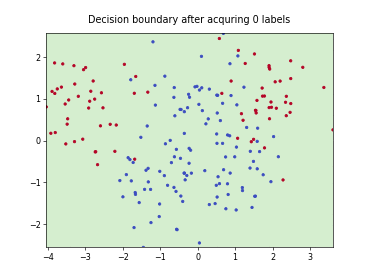skactiveml.pool.EpistemicUncertaintySampling#
- class skactiveml.pool.EpistemicUncertaintySampling(precompute=False, missing_label=nan, random_state=None)[source]#
Bases:
SingleAnnotatorPoolQueryStrategyEpistemic Uncertainty Sampling.
Epistemic uncertainty sampling query strategy for two class problems. Based on [1]. This strategy is only implemented for skactiveml parzen window classifier and sklearn logistic regression classifier.
- Parameters
- precomputeboolean, optional (default=False)
Whether the epistemic uncertainty should be precomputed. Only for ParzenWindowClassifier significant.
- missing_labelscalar or string or np.nan or None, optional
- (default=MISSING_LABEL)
Value to represent a missing label.
- random_stateint or np.random.RandomState
The random state to use.
References
- [1] Nguyen, Vu-Linh, Sébastien Destercke, and Eyke Hüllermeier.
“Epistemic uncertainty sampling.” International Conference on Discovery Science. Springer, Cham, 2019.
Methods
Get metadata routing of this object.
get_params([deep])Get parameters for this estimator.
query(X, y, clf[, fit_clf, sample_weight, ...])Determines for which candidate samples labels are to be queried.
set_params(**params)Set the parameters of this estimator.
- get_metadata_routing()#
Get metadata routing of this object.
Please check User Guide on how the routing mechanism works.
- Returns
- routingMetadataRequest
A
MetadataRequestencapsulating routing information.
- get_params(deep=True)#
Get parameters for this estimator.
- Parameters
- deepbool, default=True
If True, will return the parameters for this estimator and contained subobjects that are estimators.
- Returns
- paramsdict
Parameter names mapped to their values.
- query(X, y, clf, fit_clf=True, sample_weight=None, candidates=None, batch_size=1, return_utilities=False)[source]#
Determines for which candidate samples labels are to be queried.
- Parameters
- Xarray-like of shape (n_samples, n_features)
Training data set, usually complete, i.e. including the labeled and unlabeled samples.
- yarray-like of shape (n_samples)
Labels of the training data set (possibly including unlabeled ones indicated by self.MISSING_LABEL.
- clfskactiveml.classifier.ParzenWindowClassifier or
sklearn.linear_model.LogisticRegression
Only the skactiveml ParzenWindowClassifier and a wrapped sklearn logistic regression are supported as classifiers.
- fit_clfbool, default=True
Defines whether the classifier should be fitted on X, y, and sample_weight.
- sample_weightarray-like of shape (n_samples), default=None
Weights of training samples in X.
- candidatesNone or array-like of shape (n_candidates), dtype=int or
array-like of shape (n_candidates, n_features), optional (default=None) If candidates is None, the unlabeled samples from (X,y) are considered as candidates. If candidates is of shape (n_candidates) and of type int, candidates is considered as the indices of the samples in (X,y). If candidates is of shape (n_candidates, n_features), the candidates are directly given in candidates (not necessarily contained in X). This is not supported by all query strategies.
- batch_sizeint, default=1
The number of samples to be selected in one AL cycle.
- return_utilitiesbool, default=False
If true, also return the utilities based on the query strategy.
- Returns
- query_indicesnumpy.ndarray of shape (batch_size)
The query_indices indicate for which candidate sample a label is to queried, e.g., query_indices[0] indicates the first selected sample. If candidates is None or of shape (n_candidates), the indexing refers to samples in X. If candidates is of shape (n_candidates, n_features), the indexing refers to samples in candidates.
- utilitiesnumpy.ndarray of shape (batch_size, n_samples) or
numpy.ndarray of shape (batch_size, n_candidates) The utilities of samples after each selected sample of the batch, e.g., utilities[0] indicates the utilities used for selecting the first sample (with index query_indices[0]) of the batch. Utilities for labeled samples will be set to np.nan. If candidates is None or of shape (n_candidates), the indexing refers to samples in X. If candidates is of shape (n_candidates, n_features), the indexing refers to samples in candidates.
- set_params(**params)#
Set the parameters of this estimator.
The method works on simple estimators as well as on nested objects (such as
Pipeline). The latter have parameters of the form<component>__<parameter>so that it’s possible to update each component of a nested object.- Parameters
- **paramsdict
Estimator parameters.
- Returns
- selfestimator instance
Estimator instance.
